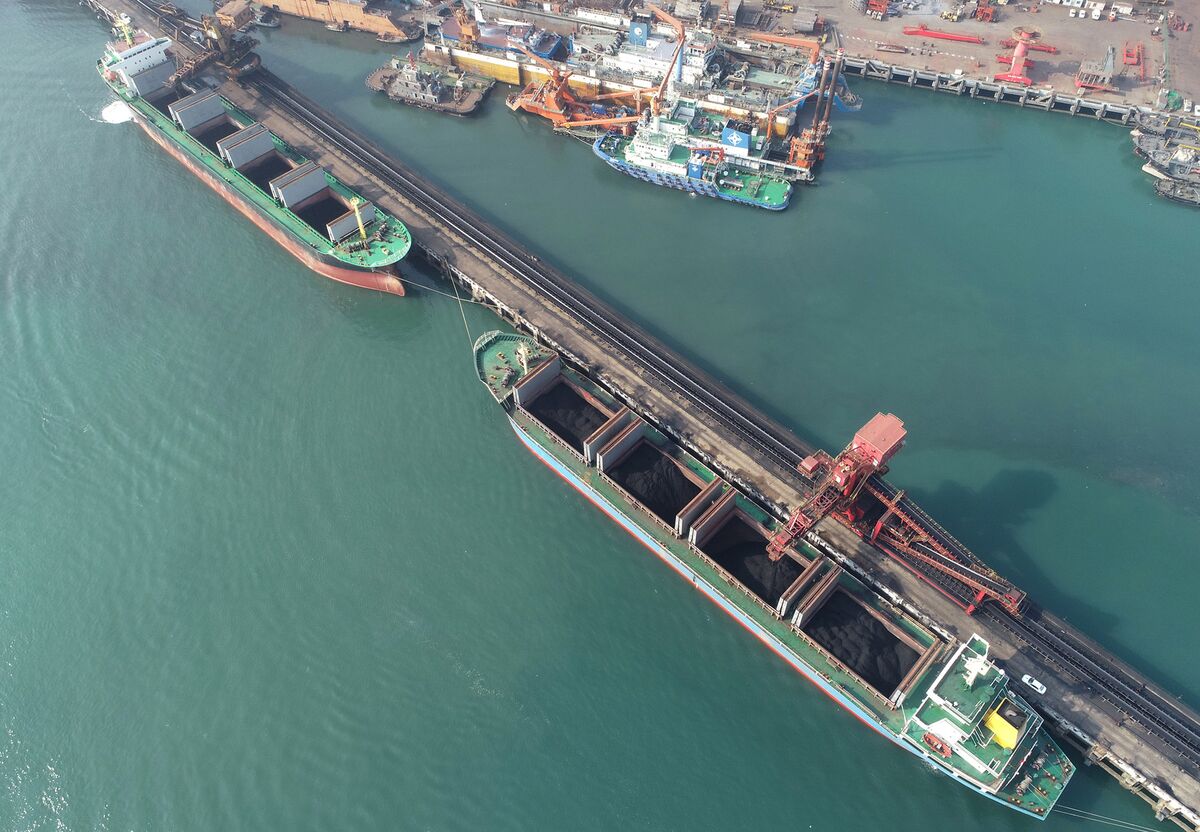

Photographer: Wang Jianmin / VCG via Getty Images
Photographer: Wang Jianmin / VCG via Getty Images
For a fresh look at the stories important to Australian business and politics, sign up for our weekly newsletter.
Seafarers trapped for months on ships transporting Australian coal off the coast of China are trapped between authorities not letting them unload their cargo and buyers not letting them leave.
Deteriorating relations between Beijing and Canberra have stranded 74 ships, about 8.1 million tons of coal and an estimated 1,480 sailors off Chinese ports, according to an analysis of shipping data by Bloomberg. The original charterer of two of the ships wants them to go elsewhere to relieve the exhausted seafarers, but so far the merchants who own the cargo have disagreed.
“It is the end receiver who has not given the green light” for the vessel Jag Anand to sail to another country where it could change crews, said Jan Dieleman, Cargill Inc.’s president of marine transportation operations. The Minneapolis-based company is the original charterer of that vessel and the Navios Coral vessel, both of which have been moored off Jingtang harbor since June awaiting the unloading of their cargoes of Australian coal.
The crew of the Jag Anand told port authorities it was ready to unload when it arrived and the bill of lading has said the ship must unload its cargo before it departs, Dieleman said. He refused to identify the final recipient of the cargo, but said that if the ship attempted to leave for another country to change crews without their permission, the ship could be arrested and seafarers put in prison.
“We don’t just want to get these people off the ship, we also want to get them home,” said Dieleman.
Tangshan Baichi Trading Co. is the recipient of the coal on the two ships, although the company could then have resold the cargo to other end users, said a person familiar with the matter who has asked not to be identified because the information is private. The company is the largest coal importer in the region and owns three coal washers, a coking plant and an investment unit focused on domestic coal and coke futures, according to its website.
Calls to the company’s office in Tangshan City went unanswered. China’s General Customs Administration did not immediately respond to faxed inquiries.
Covid-19 controls
Some of the stranded sailors are getting desperate. China has halted most crew changes to stop the spread of Covid-19, and some seafarers have worked without a break for nearly 20 months, according to the National Union of Seafarers of India.
On the Anastasia, another stranded ship, four crew members are waiting according to one report in the Sydney Morning Herald. The crew of the Jag Anand called for help in a photo distributed by the National Union of Seafarers of India, handwritten signs pointing up with messages such as “negotiate with the charterer” and “our lives are more important than your cargo.”
Hanging on the left
5.5 million tons of Australian coal have been stranded off the Chinese coast for a month or more
Source: Kpler

Relations between Australia and China have steadily deteriorated this year, with Beijing introducing tariffs on barley and wine and also informally restricting coal imports. The state newspaper Global Times has reported that the government’s economic planner appeared to be formalizing that ban, allowing power plants to import coal without restriction unless it came from Australia.
According to Carl Schou, chief executive officer of Wilhelmsen Ship Management, which oversees operations for three ships waiting outside Chinese ports, diverting ships to relieve sailors often comes down to costs. In some cases, shipowners are resistant to diverting ships to change depleted crews.

“Diverting a ship from China to anywhere costs a lot of money and someone has to pay for it,” he said. “There is a debate who should pay for it – the owner, the shipper – if it is a shared cost? Not many owners are willing to bear such costs at this point. “
When I was asked last month about a ship stranded at Jingtang, China’s Foreign Ministry accused a freight forwarder of refusing to let the ship depart.
Several ships stranded for months have recently unloaded their shipments of Australian coal, according to data intelligence company Kpler, although it is unclear whether the deliveries have cleared customs or if the shipments are being held in customs storage.
Other cargo owners appear to have sold their coal shipments outside of China. The Aquaknight and GH Harmony ships, which have been waiting outside the ports of Bao’an Shenzhen and Caofeidian since August and October without unloading their shipments, recently announced they were bound for Vietnam and Japan, Kpler said.
But shipments of Australian coal continue to move to China. Earlier this month, the Jin Lang vessel departed from Queensland’s Hay Point terminal for the open sea. Its current destination? Zhanjiang port in China.
– With help from Alfred Cang, Matt Turner, Winnie Zhu, and Martin Ritchie